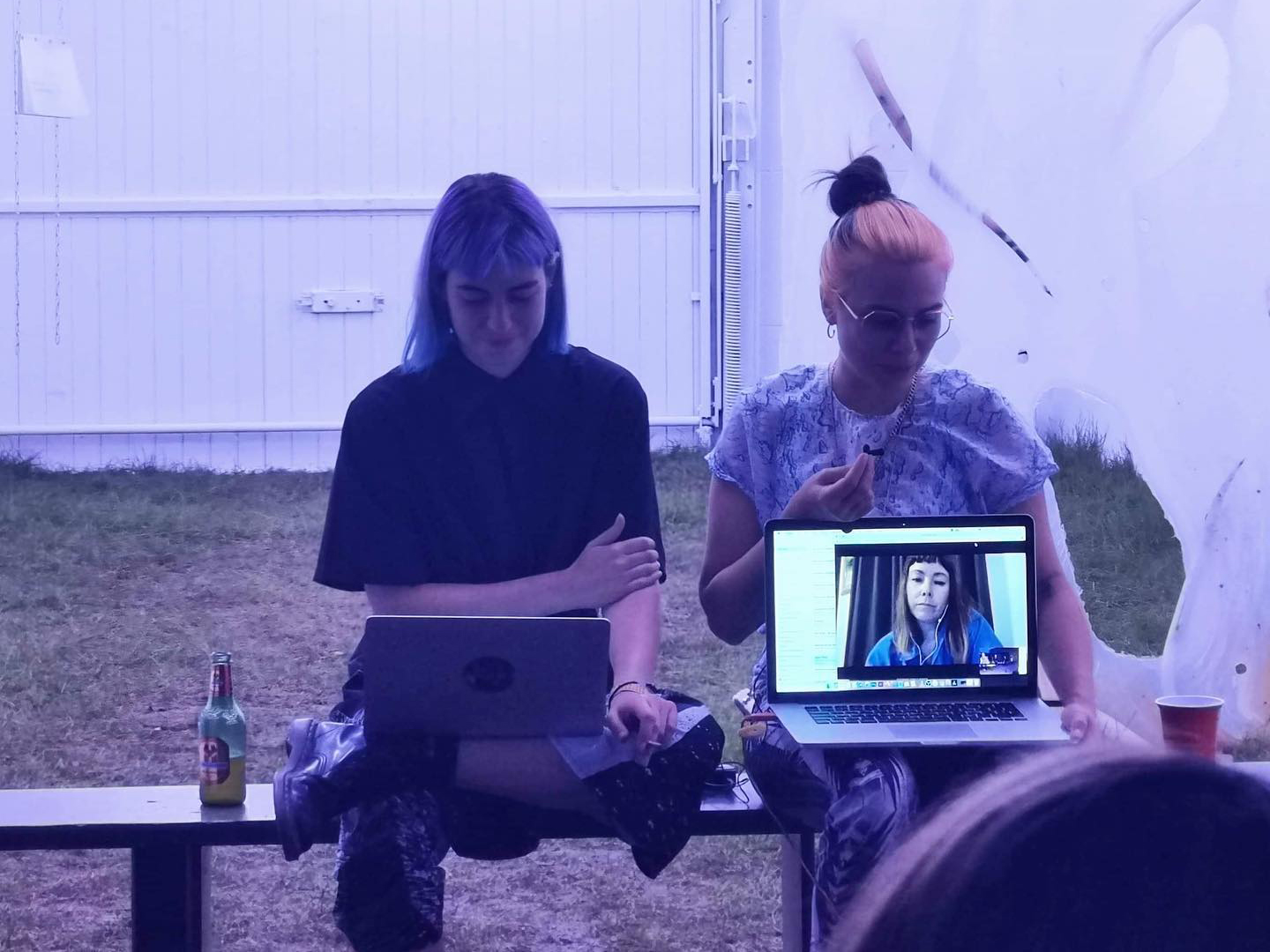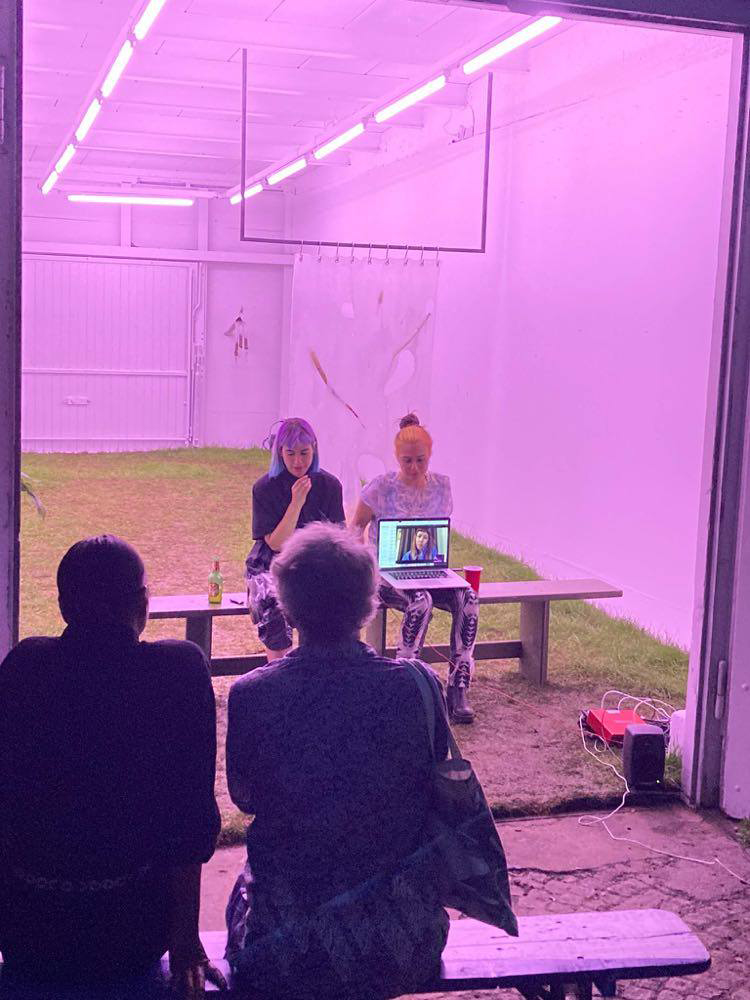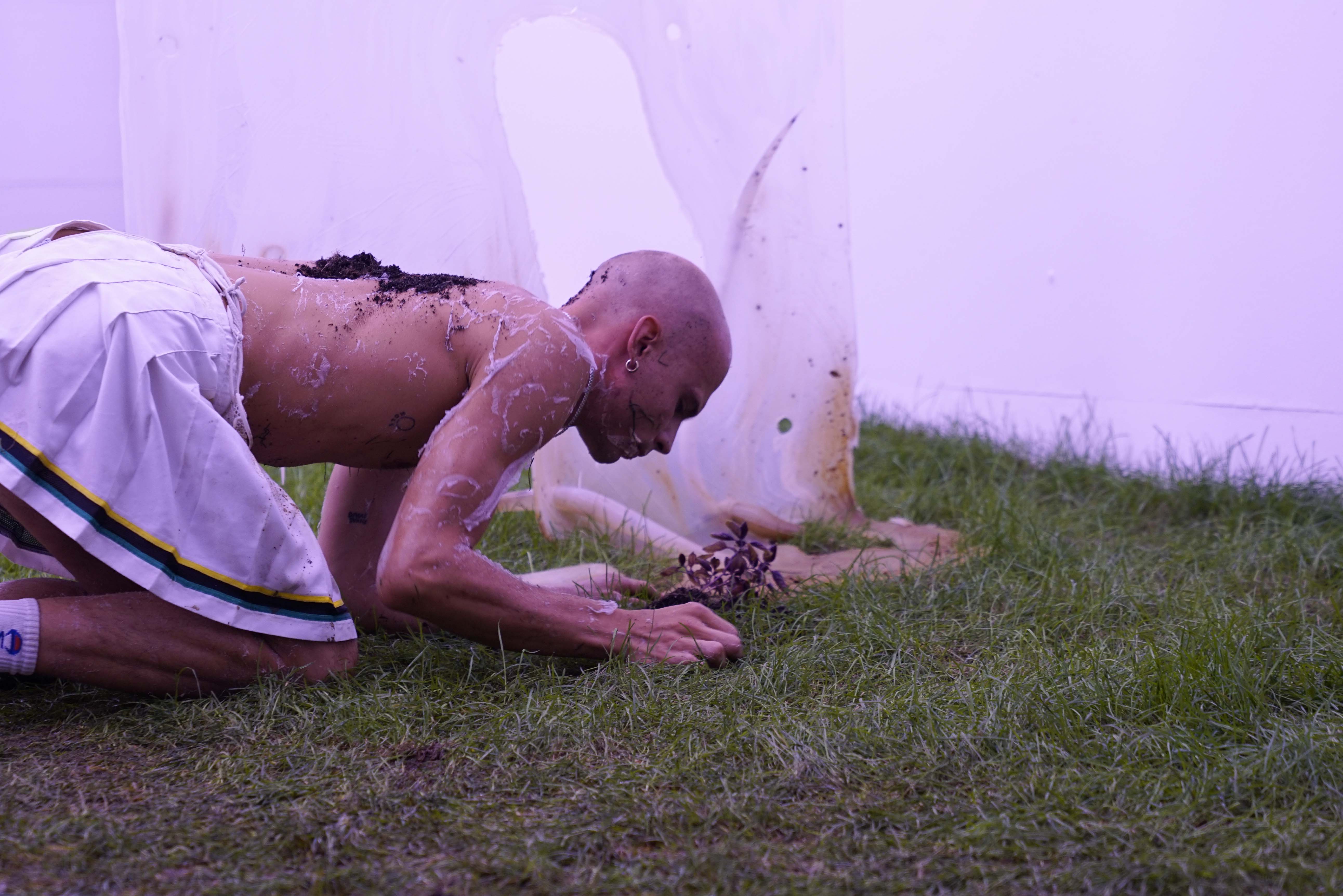Ongoing (Email) Conversation
is a format for the organisers of the exhibition project, Sofia Wickman, Giulia Busetti and Yael Wicki to contextualise and deepen the conversation regarding the subject matters 'constructive alienation', 'queer phemnomenology' and 'concept(ion)', sharing with the visitors their ongoing thought process.
“Somehow I couldn't imagine how something normally considered as negative like alienation, (at least according to the marxist theory), could not only be positive, but even necessary to the establishment of freedom.”

Curatorial talk between Giulia Busetti, Yael Wicki and Sofia Wickman during the Zurich Art Weekend, 2020 at Mikro, Zürich

Curatorial talk between Giulia Busetti, Yael Wicki and Sofia Wickman during the Zurich Art Weekend, 2020 at Mikro, Zürich

Intimate Estrangement curated by Sofia Wickman, Exhibition View, Mikro 2020

Rafal Pierzynski, Touching in times for the Estrangement Sessions, Mikro 2020
Ongoing (Email) Conversation
between Sofia Wickmann, Giulia Busetti and Yael Wicki
SOFIA:
One of my favourite things about being a curator is when it is time to decide titles. It can be for a newly produced work or the actual exhibition itself. Sometimes it’s you and the whole project team, other times it is just you and the artist. I have yet to meet an artist who’s doesn’t have their very own distinct idea, their very own personal process of what a title should be and how to get there. Each journey, individual and unique, each artist with their own particular intimate relationship to the process of title-giving. It can be an intriguing journey of words and interpretation, travelling to all kinds of destinations.
The title and the core of the exhibition, Intimate Estrangement, come from the concept of Constructive Alienation. Constructive Alienation, as a concept, deals with interference; a change of perspective, a chance to acquire a new outlook. As I was searching for the words that would become the title, I tried to imagine how Constructive Alienation related to the artists and their own journey, both artistic as personal. I imagined their struggles and their breaks. The confrontations that shape our inner- and outer being. Like Constructive Alienation, Intimate Estrangement is both friction and concurrence. It disrupts, and with its disruption it merges and unifies. It is a declaration of love made to the alien in ourselves, the intimate estrangement that inspires us to question and redefine the structures that surround us.
Dear Yael and Giulia,
I’m curious to hear your thoughts on the title and how you relate to it, both personally and in regard to Constructive Alienation?
GIULIA:
Dear Sofia,
Thank you for sharing your thoughts about the choice of the title of the exhibition. When I first read about it and the fascinating literary sources and influences, from Laboria Cuboniks' Xenofeminism theorizing to Reza Negarestani's "Where is the Concept (localization, ramification, navigation)", I was totally captured by the concept of “alienation as the labour of freedom’s construction”. Somehow I couldn't imagine how something normally considered as negative like alienation, (at least according to the marxist theory on), could not only be positive, but even necessary to the establishment of freedom. As if in order to be outright free -somewhere outside in the world- , we needed at first to be free in our intimacy, alienated even from ourselves. Considered then that "ourselves" is probably the only thing we consider "given", it required a good amount of trust in the unknown to wander the interstitial spaces described by the authors, choosing the shifts of landscape over the familiar horizon.
I realised that the concepts I was learning about had been integrated in our practice, when, after realising the exhibition and the related programme couldn't take place because of the covid-19 crisis -without blinking an eye- we automatically started designing and hypothesizing different alternative pathways, like a blob on a tree bark. What could have caused struggles and limitations have been taken as a chance to try out something new and potentially disappointing. Another season, another platform, another concept. Even if it's early to exclude the debacle, I'm happy to say we're acting quite at ease in the terrain of uncertainty. Proof of that is precisely this format, where we will freely reflect on the topics of the exhibition Intimate Estrangement and the Estrangement Sessions, but also get to know each other. We come from different backgrounds and different paths brought us to share this same experience of Constructive Alienation. What's yours Yael?
One of my favourite things about being a curator is when it is time to decide titles. It can be for a newly produced work or the actual exhibition itself. Sometimes it’s you and the whole project team, other times it is just you and the artist. I have yet to meet an artist who’s doesn’t have their very own distinct idea, their very own personal process of what a title should be and how to get there. Each journey, individual and unique, each artist with their own particular intimate relationship to the process of title-giving. It can be an intriguing journey of words and interpretation, travelling to all kinds of destinations.
The title and the core of the exhibition, Intimate Estrangement, come from the concept of Constructive Alienation. Constructive Alienation, as a concept, deals with interference; a change of perspective, a chance to acquire a new outlook. As I was searching for the words that would become the title, I tried to imagine how Constructive Alienation related to the artists and their own journey, both artistic as personal. I imagined their struggles and their breaks. The confrontations that shape our inner- and outer being. Like Constructive Alienation, Intimate Estrangement is both friction and concurrence. It disrupts, and with its disruption it merges and unifies. It is a declaration of love made to the alien in ourselves, the intimate estrangement that inspires us to question and redefine the structures that surround us.
Dear Yael and Giulia,
I’m curious to hear your thoughts on the title and how you relate to it, both personally and in regard to Constructive Alienation?
GIULIA:
Dear Sofia,
Thank you for sharing your thoughts about the choice of the title of the exhibition. When I first read about it and the fascinating literary sources and influences, from Laboria Cuboniks' Xenofeminism theorizing to Reza Negarestani's "Where is the Concept (localization, ramification, navigation)", I was totally captured by the concept of “alienation as the labour of freedom’s construction”. Somehow I couldn't imagine how something normally considered as negative like alienation, (at least according to the marxist theory on), could not only be positive, but even necessary to the establishment of freedom. As if in order to be outright free -somewhere outside in the world- , we needed at first to be free in our intimacy, alienated even from ourselves. Considered then that "ourselves" is probably the only thing we consider "given", it required a good amount of trust in the unknown to wander the interstitial spaces described by the authors, choosing the shifts of landscape over the familiar horizon.
I realised that the concepts I was learning about had been integrated in our practice, when, after realising the exhibition and the related programme couldn't take place because of the covid-19 crisis -without blinking an eye- we automatically started designing and hypothesizing different alternative pathways, like a blob on a tree bark. What could have caused struggles and limitations have been taken as a chance to try out something new and potentially disappointing. Another season, another platform, another concept. Even if it's early to exclude the debacle, I'm happy to say we're acting quite at ease in the terrain of uncertainty. Proof of that is precisely this format, where we will freely reflect on the topics of the exhibition Intimate Estrangement and the Estrangement Sessions, but also get to know each other. We come from different backgrounds and different paths brought us to share this same experience of Constructive Alienation. What's yours Yael?
Sofia Wickman (SWE)
has an artist background in multi-disciplinary audiovisual art and art history. Her artistic practice focus mainly on photography, video and installation. Between 2014 and 2015, Wickman managed the visionary art and music project Future Legends. Today she works as curator at Galleri CC, producer for the Touring Company at Dansstationen (Dansstationens Turnékompani) in Malmö, Sweden and as independent curator wherever the work takes her.
Giulia Busetti (IT)
is an independent curator who gained a theoretical background through her studies in Visual Arts (IT), Art Theory and Curatorial Practice (DE) and Arts and Cultural Management (UK). Her areas of research are the concept of cultural identity and its conflictual aesthetics, the role of the outsider and the necessity of dis-order, but also all those practices that activate the political potential of artistic practice. She lives in Zurich, where she works as assistant at Luma Westbau and as events coordinator at schwarzescafé, Löwenbräukunst
Yael Wicki (CH/CHL)
is an artist, curator and writer working and living in Zurich, Switzerland. Her practice is multidiciplinary and thinks through the subjects: order vs. disorder, emotions, navigation and neo-rationalist philosophy.
For the exhibition 'Intimate Estrangement she will put a rolled sod (dt. Rollrasen) over the floor of the exhibition space under pink plant lights in form of stiplights, creating an alienated space to reflect on limits / limitations, real and constructed.
has an artist background in multi-disciplinary audiovisual art and art history. Her artistic practice focus mainly on photography, video and installation. Between 2014 and 2015, Wickman managed the visionary art and music project Future Legends. Today she works as curator at Galleri CC, producer for the Touring Company at Dansstationen (Dansstationens Turnékompani) in Malmö, Sweden and as independent curator wherever the work takes her.
Giulia Busetti (IT)
is an independent curator who gained a theoretical background through her studies in Visual Arts (IT), Art Theory and Curatorial Practice (DE) and Arts and Cultural Management (UK). Her areas of research are the concept of cultural identity and its conflictual aesthetics, the role of the outsider and the necessity of dis-order, but also all those practices that activate the political potential of artistic practice. She lives in Zurich, where she works as assistant at Luma Westbau and as events coordinator at schwarzescafé, Löwenbräukunst
Yael Wicki (CH/CHL)
is an artist, curator and writer working and living in Zurich, Switzerland. Her practice is multidiciplinary and thinks through the subjects: order vs. disorder, emotions, navigation and neo-rationalist philosophy.
For the exhibition 'Intimate Estrangement she will put a rolled sod (dt. Rollrasen) over the floor of the exhibition space under pink plant lights in form of stiplights, creating an alienated space to reflect on limits / limitations, real and constructed.